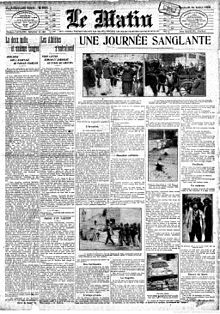Le Matin (France)
Le Matin ( German "Der Morgen" ) was a French daily newspaper that appeared in Paris from June 17, 1882 to March 1, 1883 and from February 26, 1884 to August 17, 1944 . The newspaper was initially moderately republican and was opposed to socialist ideas or Boulangism . Before the beginning of the First World War , the paper was one of the four major newspapers in France with a circulation of millions .
history

The sheet was founded by Alfred Edwards (1856-1914), a British journalist. With telegraphy, he introduced one of the new technologies of the time into the journalistic work of Le Matin .
The newspaper was modeled on the English-language daily newspaper The Morning News , which first appeared in Paris in 1882. Behind both titles was the US-led investor group Chamberlain & Co., from which the initiative for the newspaper was founded.
The seat of Le Matin was in the 10th arrondissement of Paris, at 6 Boulevard Poissonière, near the Porte Saint-Denis , while the editorial offices were in the neighboring houses 3 and 9. Buildings 6 and 9 have been preserved to this day.
In 1899, Maurice Bunau-Varilla, who had been a shareholder in Le Matin since 1897 , joined the newspaper's board of directors. From 1901 he became its president. The sheet had a circulation of 100,000 copies in 1900, 700,000 in 1910 and 1 million by 1914. This made it one of the four largest daily newspapers in France , along with its competitors Le Petit Journal , Le Petit Parisien and Le Journal .
The paper was of particular importance at the beginning of the First World War when it reported in November 1914 that the encryption method ( ÜBCHI ) used by the German army had been successfully deciphered . The Imperial General Staff then changed the method, but replaced it with the even less secure ABC cipher .
At the end of the 1930s, Le Matin still had a circulation of around 300,000 copies.
After the occupation of France by the German Wehrmacht , Le Matin reported faithfully to Vichy and, at the decisive instigation of the Chairman of the Board of Directors, Bunau-Varilla, even adopted a pro-German and right-wing extremist stance. The daily was therefore banned after the liberation of Paris on charges of collaboration with the enemy after it had appeared over a period of 62 years.
The Le Matin archive is now in the French National Archives.
Former Employees
- Alfred Détrez
- Jules-Théophile Docteur, President, General Manager (1930–1938)
- Jules Hedeman
- Henry de Jouvenel
- Georges de Labruyière
- Stéphane Lauzanne
- Jules Madeline, Chairman of the Board of Directors (1903–1920)
- Stefanie Landeis , France's first foreign correspondent in Berlin from 1934 to 1938
- Jules Sauerwein
- Maurice Sauvayre
literature
- Dominique Pinsolle: Le Matin (1884-1944). Une presse d'argent et de chantage . Rennes, Presses universitaires de Rennes 2012. ISBN 978-2753517356
Web links
Individual evidence
- ↑ Le Matin, Paris 1882-1883 . French National Library, Gallica digitization project . On: bnf.fr, accessed March 25, 2017
- ↑ Le Matin, Paris 1894–1944 . French National Library, Gallica digitization project . On: bnf.fr, accessed March 25, 2017
- ↑ René Le Cholleux: Revue biographique of notabilités françaises contemporaines . tome 3, Paris 1892, pp. 332-333.
- ↑ Dominique Pinsolle: Le Synthol, moteur de l'histoire . In: Le Monde diplomatique, August 2009. p. 3
- ↑ Stéphane Lauzanne: Un grand journal français: Le Matin - Son organization - Sa puissance - Son action (1924). From: journal-le-matin.over-blog.com, accessed on March 25, 2017

